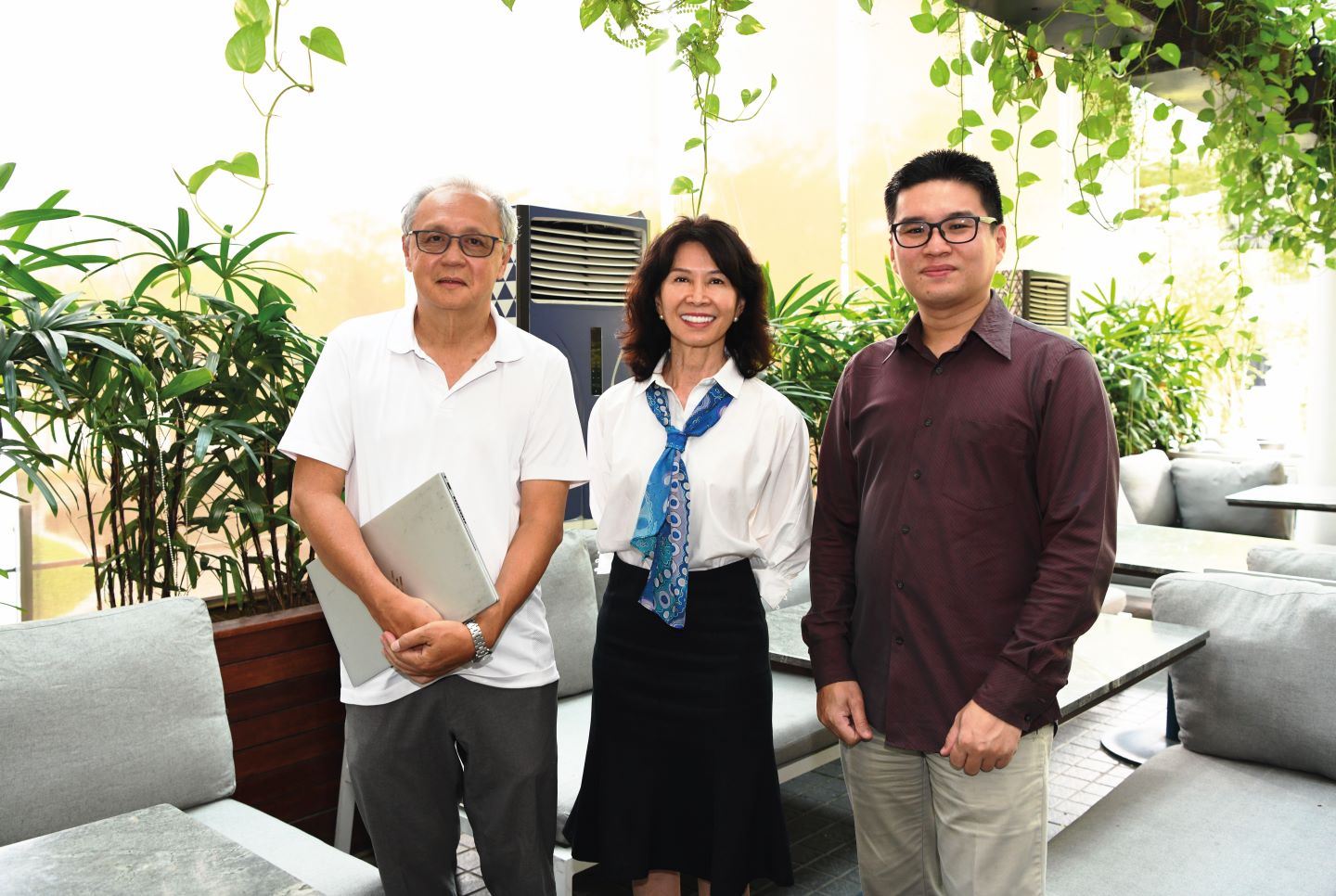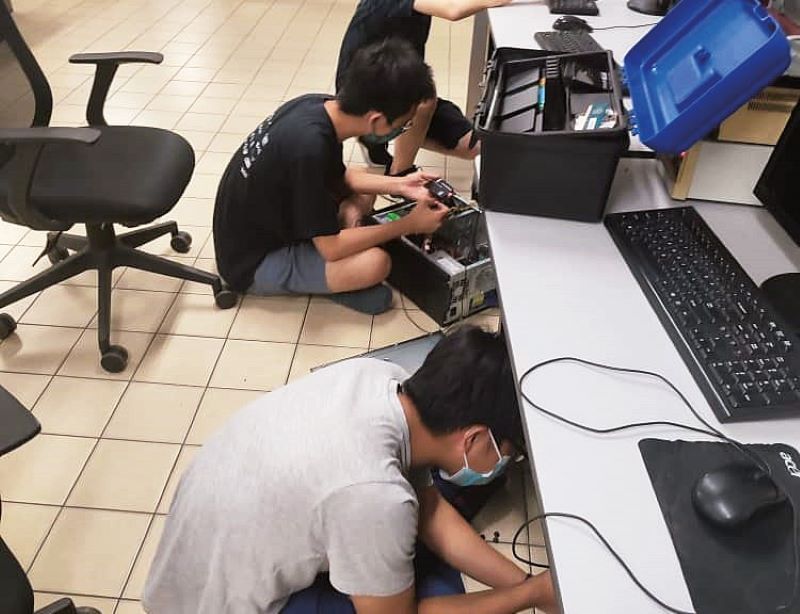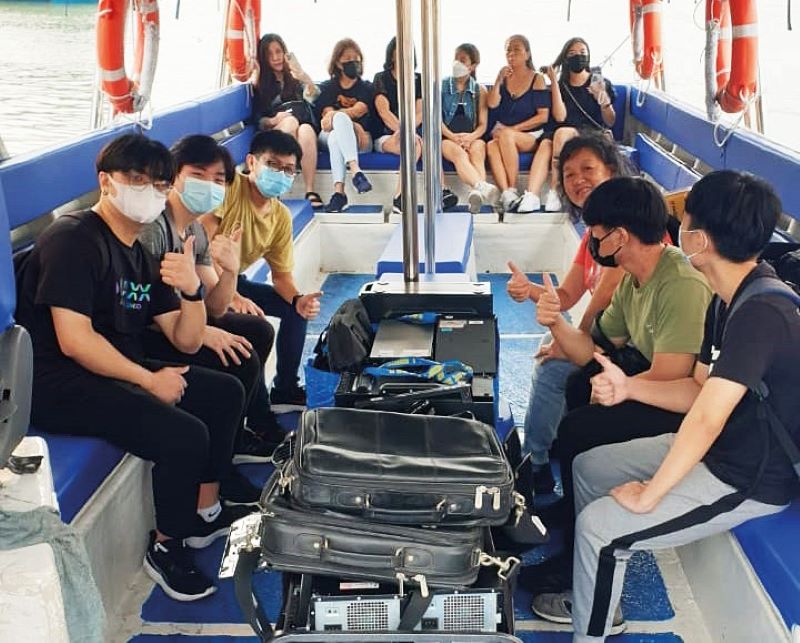
From left: Dr Toh Cheng Teik, Dr Low Pek See and Kenny Khoo (Photo: Patrick Goh/The Edge Malaysia)
A Unesco report released in April 2020 estimated at least 1.5 billion students and 63 million primary and secondary schoolteachers were affected by school closures in 191 countries at the onset of the pandemic.
The data was a startling revelation: Half of the students (almost 830 million) who could not attend school due to stay-at-home orders had no access to a computer, while more than 40% did not have internet connectivity in their houses. Closer to home, the situation could not be further from the truth.
Poorer households often had only one device available for all of their online learning and working requirements. The number of students dropping out due to a lack of connectivity and gadgets was a great cause for concern. Remember how Veveonah Mosibin from Sabah climbed up a tree just to get access to the internet for an online exam? You get the picture. For the B40 income group, life as they knew it just became harder.
Free computers
Realising a need, Medical Awareness Camp Outreach (Maco) embarked on a computer empowerment programme under The School Project umbrella as learning institutions were forced to close for extended periods during the Movement Control Order and students had no choice but to switch to online learning.
“Maco started a public appeal for used computers to redress the plight of students without digital devices. Most had to share their parents’ handphones with their siblings. Our first laptop went out in August 2020 and we built our first school lab in September that year,” says Dr Low Pek See, the founding president of Maco, which is overseen by nine core members who all have full-time jobs, together with a small group of volunteers and interns.
Used computers are repurposed first before being distributed to students and schools. It costs about RM200 to replace the hard disks with SSDs (solid-state drives) and install learning software.
“It’s easier to refurbish a computer than a laptop. Each set comes complete with CPU, keyboard, mouse, screen, new webcam and headphones. We’ve also given out data plans to more than 100 students since we started on this project,” explains civil engineer Dr Toh Cheng Teik, the current president of Maco.
“We usually celebrate the little milestones with every 1,000th computer given out. As of October last year, we had delivered 3,000 computers to students from about 200 schools and the list is growing. People learn about us through word of mouth and we are blessed to have a group of interns help us develop an efficient way of working, from repurposing the computers to making deliveries and installations at schools around Peninsular Malaysia,” says Kenny Khoo, the IT head of Maco.
How it all began
img-20230222-wa0129_1.jpg

Maco’s journey began in 2013 as a large-scale pro bono medical camp on Sundays that ran for a good six years. The camp, consisting of medical and dental specialists and dedicated volunteers from around the Klang Valley, had pre-clinical stations to check blood pressure, BMI, random blood sugar and bone densitometry. Each registered patient would then undergo a screening triage with three to five medical officers before being referred to the respective specialists and prescribed medication. Those in need of further medical management would then get a referral to the nearest government hospital.
“Our medical team was capable of managing about 300 people in three hours. Women would be sent for a Pap smear and breast screening. We even had a portable ultrasound machine. It was a comprehensive medical service,” recalls Toh, who was responsible for the camp’s publicity and infrastructure together with another co-founder Anna Chan.
“I was responsible for organising the entire medical and dental teams, and the modus operandi. We successfully organised 28 such camps in both urban and rural areas within Selangor until 2019,” adds Low.
In January 2020, The School Project was set up to help students and their families from the B40 community. This started off with the meal programme. To ensure optimum use of the aid rendered, they work very closely with the schools’ board of directors, administration and parent-teacher association. The programme was reinstated when schools reopened in early 2022.
“After the country went into lockdown, we started Essential Aid for Families as the dire conditions of daily wage earners were exposed. As more workers were getting laid off, we knew we had to continue assisting these families by providing essential food and hygiene items, as well as some cash to help with their utility bills. While doing that, we noticed there was a great need for computers among the underprivileged,” remarks Low.
Equipping poor students with laptops and schools with computer labs remains their key focus now and they are calling for the corporate sector to put their electronic waste to good use.
Running on a passion
boat_delivery_pulau_ketam_img-20221105-wa0386.jpg

“We are inundated with requests from schools for help. We are very grateful to corporations like UOB, Great Eastern and Mr DIY that donated computers when they were updating their system. We will be running short of used computers to repurpose by mid-April while school requests are scheduled until mid-August,” Low shares.
Toh is grateful for the support they have been receiving so far because people know their money is not frittered away and everything is accounted for. “They trust us because we are transparent. Our Facebook updates help build our case because they document every single activity carried out by Maco.”
“We are looking for an organisation or foundation to support us annually because we want to keep the momentum going. We don’t refuse anyone who asks. We also need monetary contributions to repurpose the computers, build the school labs and pay our interns. We are looking at a succession plan. We’re getting old and we need new blood to continue the work we have started,” he adds.
There are so many heart-warming stories that fuel Low’s work at Maco.
“It could be friends who reach out to me to offer help or the testimonies of students who have excelled in their studies using the computers they received from us. I’m indebted to the Tropicana Foundation for helping us transport large quantities of computers as well as the Thiam Lai Yean Foundation and KLK.”
To find out more about Maco and how you can help, check out their Facebook page or email [email protected].
This article first appeared on Mar 20, 2023 in The Edge Malaysia.


